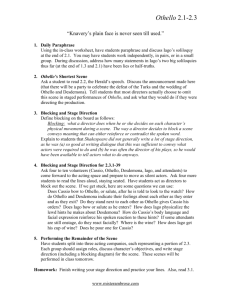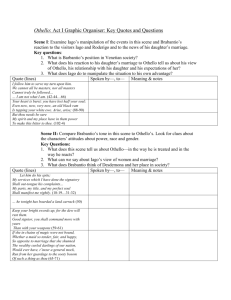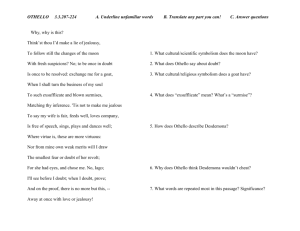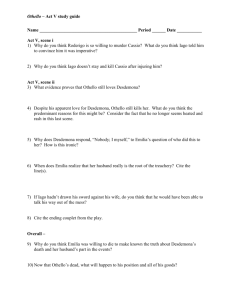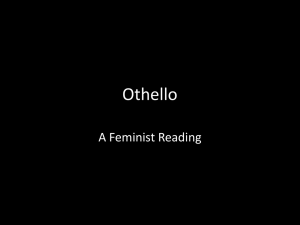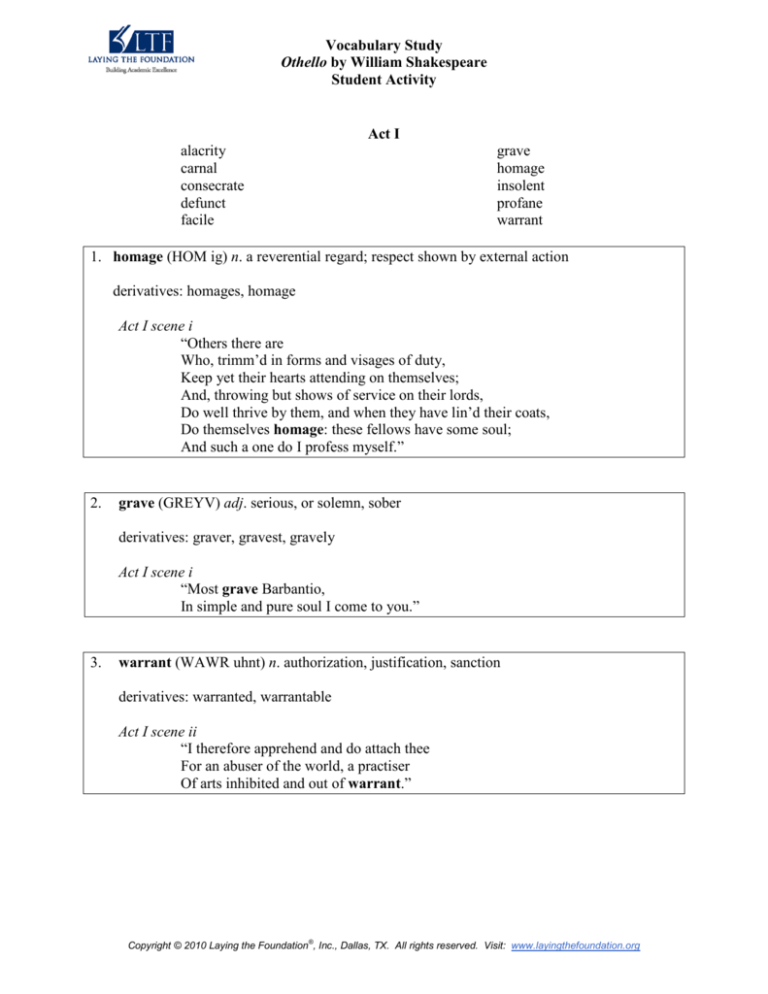
Vocabulary Study
Othello by William Shakespeare
Student Activity
Act I
alacrity
carnal
consecrate
defunct
facile
grave
homage
insolent
profane
warrant
1. homage (HOM ig) n. a reverential regard; respect shown by external action
derivatives: homages, homage
Act I scene i
“Others there are
Who, trimm’d in forms and visages of duty,
Keep yet their hearts attending on themselves;
And, throwing but shows of service on their lords,
Do well thrive by them, and when they have lin’d their coats,
Do themselves homage: these fellows have some soul;
And such a one do I profess myself.”
2.
grave (GREYV) adj. serious, or solemn, sober
derivatives: graver, gravest, gravely
Act I scene i
“Most grave Barbantio,
In simple and pure soul I come to you.”
3.
warrant (WAWR uhnt) n. authorization, justification, sanction
derivatives: warranted, warrantable
Act I scene ii
“I therefore apprehend and do attach thee
For an abuser of the world, a practiser
Of arts inhibited and out of warrant.”
Copyright © 2010 Laying the Foundation®, Inc., Dallas, TX. All rights reserved. Visit: www.layingthefoundation.org
SAT Vocabulary Study: Othello
4.
facile (FAS il) adj. moving or proceeding with ease, easily done or performed
derivatives: facilely, facileness
Act I scene iii
“And let ourselves again but understand
That, as it more concerns the Turk than Rhodes,
So may he with more facile question bear it . . .”
5.
insolent (IN suh lunt) adj. insulting or contemptuous
derivatives: insolence, insolently, insolency, insolentness
Act I scene iii
I ran it through, even from my boyish days
To the very moment that he bade me tell it:
Wherein I spake of most disastrous chances,
Of moving accidents by flood and field;
Of hair-breadth scapes I’ the imminent deadly breach;
Of being taken by the insolent foe,
And sold to slavery; of my redemption thence,
And portance in my travels’ history:
Wherein of antres vast and deserts idle,
Rough quarries, rocks, and hills whose heads touch heaven,
It was my hint to speak,—such was the process . . .”
6.
alacrity (uh LAK ruh tee) n. prompt and cheerful response
derivatives: alacritous
Act I scene iii
“The tyrant custom, most grave senators,
Hath made the flinty and steel couch of war
My thrice-driven bed of down: I do agonize
A natural and prompt alacrity
I find in hardness . . .”
Copyright © 2010 Laying the Foundation®, Inc., Dallas, TX. All rights reserved. Visit: www.layingthefoundation.org
SAT Vocabulary Study: Othello
7.
consecrate (KON suh krate) v. to dedicate or to declare sacred
derivatives: consecrated, consecrating, consecration
Act I scene iii
“I saw Othello’s visage in his mind;
And to his honors and his valiant parts
Did I my soul and fortunes consecrate.
So that, dear lords, if I be left behind,
A moth of peace, and he go to the war,
The rites for which I love him are bereft me,
And I a heavy interim shall support
By his dear absence.”
8.
defunct (deh FUNGKT) adj. no longer existing, not operating or functioning, dead
derivatives: defunction, defunctive
Act I scene iii
“Vouch with me, heaven, I therefore beg it not
To please the palate of my appetite;
Nor to comply with heat,—the young affects
In me defunct,—and proper satisfaction;
But to be free and bounteous to her mind:
And heaven defend your good souls, that you think
I will your serious and great business scant
For she is with me . . .”
9.
carnal (KAR nul) adj. marked by sexuality that is often frank and unrelieved by higher
emotions
derivatives: carnalist, carnality, carnalize
Act I scene iii
“If the balance of our lives had not one scale of reason
To poise another of sensuality, the blood and baseness
of our natures would conduct us to most preposterous conclusions:
But we have reason to cool our raging motions, our carnal stings,
our unbitted lusts; whereof I take this, that you call love,
to be a sect or scion.”
Copyright © 2010 Laying the Foundation®, Inc., Dallas, TX. All rights reserved. Visit: www.layingthefoundation.org
SAT Vocabulary Study: Othello
10. profane (pruh FANE) v. to show contempt toward sacred things
derivatives: profanation, profanely, profaner, profanity
Act I scene iii
“Thus do I ever make my fool my purse;
For I mine own gain’d knowledge should profane
If I would time expend with such a snipe
But for my sport and profit.”
Copyright © 2010 Laying the Foundation®, Inc., Dallas, TX. All rights reserved. Visit: www.layingthefoundation.org
SAT Vocabulary Study: Othello
Act II
bestial
dilatory
discern
discretion
enmesh
1.
lechery
mutiny
paradoxes
propriety
surfeited
discern (deh SURN) v. to differentiate between two or more things
derivatives: discerned, discernable, discernment
Act II scene i
“What from the cape can you discern at sea?”
2.
surfeited (SUR feh ted) v. fed or supplied to excess
derivatives: surfeit, surfeiter
Act II scene i
“His bark is stoutly timber’d, and his pilot
Of very expert and approv’d allowance;
Therefore my hopes, not surfeited to death,
Stand in bold cure.”
3.
paradoxes (PAIR uh doks es) pl.n. things that appear false or contradictory but are
actually correct
derivatives: paradoxical, paradoxically
Act II scene i
“These are old fond paradoxes to make fools laugh i’ the
alehouse. What miserable praise hast thou for her that’s foul
and foolish?”
4.
mutiny (MYOOT n ee) n. rebellion, revolt or rebellion against constituted authority
derivatives: munities, mutinied, mutinying
Act II scene i
“Sir, he is rash, and very sudden in choler, and haply with his
truncheon may strike at you: provoke him, that he may; for even
out of that will I cause these of Cyprus to mutiny, whose
qualification shall come into no true taste again but by the
displanting of Cassio.”
Copyright © 2010 Laying the Foundation®, Inc., Dallas, TX. All rights reserved. Visit: www.layingthefoundation.org
SAT Vocabulary Study: Othello
5.
lechery (LECH ur ee) n. the act of indulging excessively in sexual activity or in
lasciviousness
derivatives: lecher, lecherous, lecherousness
Act II scene i
“Lechery, by this hand; an index and obscure prologue to the
history of lust and foul thoughts. They met so near with their
lips that their breaths embraced together.”
6.
discretion (deh SKRESH un) n. ability to act on one’s own power of individual decision
derivatives: discretional, discretionally, discretionary
Act II scene iii
“Good Michael, look you to the guard to-night:
Let’s teach ourselves that honourable stop,
Not to out-sport discretion.”
7.
propriety (pruh PRY eh tee) n. correct conduct
derivative: proprieties
Act II scene iii
“Silence that dreadful bell; it frights the isle
From her propriety.”
8.
bestial (BES chul ) adj. brutal without reason, having the attributes of a savage
derivatives: bestiality, bestialize
Act II scene iii
“Reputation, reputation, reputation! O, I have lost my
reputation! I have lost the immortal part of myself, and what
remains is bestial.”
Copyright © 2010 Laying the Foundation®, Inc., Dallas, TX. All rights reserved. Visit: www.layingthefoundation.org
SAT Vocabulary Study: Othello
9.
enmesh (en MESH) v. to entangle
derivatives: enmeshed, enmeshment
Act II scene iii
“So will I turn her virtue into pitch;
And out of her own goodness make the net
That shall enmesh them all.”
10. dilatory (DIL uh tor ee) adj. delaying, slow
derivatives: dilatoriness, dilatorily
Act II scene iii
“How poor are they that have not patience!
What wound did ever heal but by degrees?
Thou know’st we work by wit, and not by witchcraft;
And wit depends on dilatory time.”
Copyright © 2010 Laying the Foundation®, Inc., Dallas, TX. All rights reserved. Visit: www.layingthefoundation.org
SAT Vocabulary Study: Othello
Act III
affinity
chide
entreat
hideous
languishes
penitent
ruminate
shrill
vehement
virtuous
1. virtuous (VUR choo uhs) adj. conforming to moral and ethical principles; morally excellent,
upright, chaste
derivatives: virtue, virtuously, virtuousness
Act III scene i
“Why, no; the day had broke
Before we parted. I have made bold, Iago,
To send in to your wife: my suit to her
Is, that she will to virtuous Desdemona
Procure me some access.”
2. affinity (uh FIN uh tee) n. a likeness, a natural relationship, a kinship
derivatives: affinitive, affinities
Act III scene i
“Good-morrow, good lieutenant; I am sorry
For your displeasure; but all will sure be well.
The general and his wife are talking of it;
And she speaks for you stoutly: the Moor replies
That he you hurt is of great fame in Cyprus
And great affinity, and that, in wholesome wisdom,
He might not but refuse you; but he protests he loves you
And needs no other suitor but his likings
To take the safest occasion by the front
To bring you in again.”
3. languishes (LANG gwish) v. to be or become weak or feeble, droop, fade
derivatives: languish, languisher
Act III scene iii
“How now, my lord!
I have been talking with a suitor here,
A man that languishes in your displeasure.”
Copyright © 2010 Laying the Foundation®, Inc., Dallas, TX. All rights reserved. Visit: www.layingthefoundation.org
SAT Vocabulary Study: Othello
4. penitent (PEN eh tunt) adj. showing or feeling regret for wrongdoing, repentant
derivatives: penitence, penitency, penitential
Act III scene iii
“Why then to-morrow night; or Tuesday morn;
On Tuesday noon, or night; on Wednesday morn:—
I pr’y thee, name the time; but let it not
Exceed three days: in faith, he’s penitent;
And yet his trespass, in our common reason,—
Save that, they say, the wars must make examples
Out of their best,—is not almost a fault
To incur a private check.”
5. entreat (en TREET) v. to ask (a person) earnestly, beseech, implore, beg
derivatives: entreaty, entreating, entreatingly, entreatment
Act III scene iii
“Why, this is not a boon;
’Tis as I should entreat you wear your gloves,
Or feed on nourishing dishes, or keep you warm,
Or sue to you to do a peculiar profit
To your own person: nay, when I have a suit
Wherein I mean to touch your love indeed,
It shall be full of poise and difficult weight,
And fearful to be granted.”
6. hideous (HID ee uhs) adj. horrible or frightful to the senses; repulsive; very ugly; shocking
or revolting to the moral sense
derivatives: hideously, hideousness
Act III scene iii
“Think, my lord! By heaven, he echoes me,
As if there were some monster in his thought
Too hideous to be shown.”
Copyright © 2010 Laying the Foundation®, Inc., Dallas, TX. All rights reserved. Visit: www.layingthefoundation.org
SAT Vocabulary Study: Othello
7. ruminate (ROO muh nate) v. to consider for a long time at a slow pace, to ponder
derivatives: reminatingly, ruminator, ruminative
Act III scene iii
“Nay, yet there’s more in this:
I pr’ythee, speak to me as to thy thinkings,
As thou dost ruminate; and give thy worst of thoughts
The worst of words.”
8. vehement (VEE uh munt) adj. forcefully expressing emotion or conviction
derivatives: vehemence, vehemency, vehemently
Act III scene iii
“My lord, I would I might entreat your honour
To scan this thing no further; leave it to time:
Though it be fit that Cassio have his place,—
For sure he fills it up with great ability,—
Yet, if you please to hold him off awhile,
You shall by that perceive him and his means:
Note if your lady strain his entertainment
With any strong or vehement importunity;
Much will be seen in that.”
9. chide (CHAHYD) v. to express disapproval of, scold, reproach
derivatives: chid, chider, chidingly
Act III scene iii
“Do not you chide; I have a thing for you.”
10. shrill (SHRIL) adj. high-pitched and piercing in sound quality
derivatives: shrilly, shrillness
Act III scene iii
“O, farewell,
Farewell the neighing steed and the shrill trump,
The spirit-stirring drum, the ear-piercing fife,
The royal banner, and all quality,
Pride, pomp, and circumstance of glorious war!”
Copyright © 2010 Laying the Foundation®, Inc., Dallas, TX. All rights reserved. Visit: www.layingthefoundation.org
SAT Vocabulary Study: Othello
Act IV
beguile
bestow
credulous
ecstasy
fulsome
galls
garnered
lethargy
peevish
wanton
1. bestow (be STOW) v. to grant or to give
derivatives: bestowal, bestowed, bestowment
Act IV scene i
“Why, then, ’tis hers, my lord, and being hers,
She may, I think, bestow’t on any man.
2. fulsome (FOOL sem) adj. disgusting or offensive, esp. because excessive or insincere;
ample, abundant, plentiful
derivatives: fulsomely, fulsomeness
Act IV scene i
“Lie with her! lie on her!—We say lie on her when they belie
her.—Lie with her! That’s fulsome.—Handkerchief—confessions—
handkerchief!—To confess, and be hanged for his labour,—first,
to be hanged, and then to confess.—I tremble at it.”
3. credulous (KREJ e les) adj. tending to believe too readily, easily convinced
derivatives: credulously, credulousness
Act IV scene i
“Work on,
My medicine, work! Thus credulous fools are caught;
And many worthy and chaste dames even thus,
All guiltless, meet reproach.”
4. lethargy (leh THAR je) n. the state of being sluggish or languid
derivatives: lethargic, lethargically
Act IV scene i
“No, forbear;
The lethargy must have his quiet course:
If not, he foams at mouth, and by and by
Breaks out to savage madness.”
Copyright © 2010 Laying the Foundation®, Inc., Dallas, TX. All rights reserved. Visit: www.layingthefoundation.org
SAT Vocabulary Study: Othello
5. wanton (WAHN tun) n. immorality, lewdness
derivatives: wantonly, wantonness
Act IV scene i
“O, ’tis the spite of hell, the fiend’s arch-mock,
To lip a wanton in a secure couch,
And to suppose her chaste!”
6. ecstasy (EK sta se) n. a feeling of overpowering joy, great delight, rapture; a trance
derivatives: ecstasies, ecstatic
Act IV scene i
“Whilst you were here o’erwhelmed with your grief,—
A passion most unsuiting such a man,—
Cassio came hither: I shifted him away,
And laid good ’scuse upon your ecstasy;
Bade him anon return, and here speak with me;
The which he promis’d.”
7. beguile (buh GUYL) v. to deceive, to mislead, to persuade with charm
derivatives: beguiled, beguiling, beguiler
Act IV scene i
“Now will I question Cassio of Bianca,
A housewife that, by selling her desires,
Buys herself bread and clothes: it is a creature
That dotes on Cassio,—as 'tis the strumpet’s plague
To beguile many and be beguil’d by one . . . ”
8. garnered (GAR ner d) v. to gather and store in or as if in a granary; to amass, acquire
derivatives: garner, garnering
Act IV scene ii
“Yet could I bear that too; well, very well:
But there, where I have garner’d up my heart;
Where either I must live or bear no life,—
The fountain from the which my current runs,
Or else dries up; to be discarded thence!”
Copyright © 2010 Laying the Foundation®, Inc., Dallas, TX. All rights reserved. Visit: www.layingthefoundation.org
SAT Vocabulary Study: Othello
9. peevish (PEE vish) adj. fretfull, obstinate
derivatives: peevishly, peevishness, peeve, peeved
Act IV scene iii
“But I do think it is their husbands’ faults
If wives do fall: say that they slack their duties
And pour our treasures into foreign laps;
Or else break out in peevish jealousies. . . .”
10. galls (GOL s) pl. n. bitterness of feeling, rancor; things bitter to endure
derivatives: gall, galled, galling
Act IV scene iii
“Why, we have galls; and though we have some grace,
Yet have we some revenge.”
Copyright © 2010 Laying the Foundation®, Inc., Dallas, TX. All rights reserved. Visit: www.layingthefoundation.org
SAT Vocabulary Study: Othello
Act V
balmy
base
forsake
malice
odious
perjury
pernicious
portents
quench
traduced
1. malice (MAL is) n. desire to harm others
derivatives: malicious, maliciously, maliciousness
Act V scene i
“For you, mistress,
Save you your labour.—He that lies slain here, Cassio,
Was my dear friend: what malice was between you?”
2. quench (KWENCH) v. to put out or extinguish; to subdue, overcome, quell
derivatives: quenchable, quencher, unquenched
Act V scene ii
“Yet she must die, else she’ll betray more men.
Put out the light, and then put out the light:
If I quench thee, thou flaming minister . . .”
3. balmy (BAH mee) adj. mild and refreshing; soft, soothing; having the qualities of balm,
aromatic, fragrant
derivatives: balmily, balminess
Act V scene ii
“O, balmy breath, that dost almost persuade
Justice to break her sword!—One more, one more;—
Be thus when thou art dead, and I will kill thee,
And love thee after.”
4. portents (PAWR tent s) pl. n. an indication or omen of something about to happen, esp.
something momentous; threatening or disquieting significance
deriviatives: portent, portentous, portentousness, portentously
Act V scene ii
“Some bloody passion shakes your very frame:
These are portents; but yet I hope, I hope,
They do not point on me.”
Copyright © 2010 Laying the Foundation®, Inc., Dallas, TX. All rights reserved. Visit: www.layingthefoundation.org
SAT Vocabulary Study: Othello
5. perjury (PUR juh ree) n. the willful giving of false testimony under oath or affirmation,
before a competent tribunal, upon a point material to a legal inquiry
derivatives: perjuries, perjurious, perjuriousness
Act V scene ii
“Sweet soul, take heed,
Take heed of perjury; thou’rt on thy death-bed.”
6. pernicious (pur NISH us) adj. very destructive or harmful, deadly
derivatives: perniciously, perniciousness
Act V scene ii
“If he say so, may his pernicious soul
Rot half a grain a day! he lies to the heart:
She was too fond of her most filthy bargain.”
7. odious (oh DEE US) adj. deserving hate or contempt
derivatives: odiously, odiousness
Act V scene ii
“You told a lie; an odious, damned lie;
Upon my soul, a lie; a wicked lie:—
She false with Cassio!—Did you say with Cassio?”
8. forsake (fawr SEYK) v. to quit or leave entirely; abandon, desert; to give up or
renounce
derivatives: forsaker, forsaking
Act V scene ii
“You must forsake this room, and go with us:
Your power and your command is taken off,
And Cassio rules in Cyprus.”
Copyright © 2010 Laying the Foundation®, Inc., Dallas, TX. All rights reserved. Visit: www.layingthefoundation.org
SAT Vocabulary Study: Othello
9. base (BASE) adj. lacking higher values
derivatives: baseness, baser, basely
Act V scene ii
“I pray you, in your letters,
When you shall these unlucky deeds relate,
Speak of me as I am; nothing extenuate,
Nor set down aught in malice: then must you speak
Of one that loved not wisely, but too well;
Of one not easily jealous, but, being wrought,
Perplex’d in the extreme; of one whose hand,
Like the base Judean, threw a pearl away
Richer than all his tribe. . . .”
10. traduced (truh DOOS d) v. slandered or spoke falsely about someone
derivatives: traduce, traduces, traducement
Act V scene ii
“Set you down this;
And say besides,—that in Aleppo once,
Where a malignant and a turban’d Turk
Beat a Venetian and traduc’d the state,
I took by the throat the circumcised dog
And smote him—thus.”
Copyright © 2010 Laying the Foundation®, Inc., Dallas, TX. All rights reserved. Visit: www.layingthefoundation.org
SAT Vocabulary Study: Othello
Fill-in-the-Blank Activity
Othello
Using the SAT words below, fill in the blanks with suitable vocabulary choices. Each word or its
derivative is used once. The answers may not or may not be used in the same plot context as in
the quotations given with the definitions.
Act I
alacrity
carnal
consecrate
defunct
facile
grave
homage
insolent
profane
warrant
1. The foolish Roderigo constantly pays __________________ to Iago, gives Iago his
money to court Desdemona, and receives nothing in return.
2. When he learns that Desdemona has married Othello, Roderigo believes his hopes of
winning Desdemona are __________________ and threatens to drown himself until Iago
reveals his malicious plan.
3. Iago uses Roderigo’s jealous rage to undermine and _________________ Othello’s love
for Desdemona.
4. In the middle of the night, Roderigo wakes Brabantio, making lewd, ______________
accusations about Othello and Desdemona.
5. The audience learns through his soliloquies and asides that Iago’s villainy has no
______________, but is simply cold, calculating, and spiteful.
6. Roderigo’s blatant racism is evident in his ______________ remarks about the Moor’s
appearance.
7. Othello is not alarmed by the late night confrontation with Brabantio, Roderigo, and the
Officer, but rather asks with ______________ that they all put up their swords before
they rust in the night air.
8. The Duke, with swift and _______________ authority, settles the questions of the
unexpected marriage of the senator’s daughter and the pending attack by the Turks by
sending Othello and Desdemona to Cyprus.
Copyright © 2010 Laying the Foundation®, Inc., Dallas, TX. All rights reserved. Visit: www.layingthefoundation.org
SAT Vocabulary Study: Othello
9. Othello solemnly _______________ himself to follow the Duke’s orders, to defend
Cypress, and to depart immediately even though it is his wedding night.
10. Brabantio’s last comment to Othello is a _________________ and ominous warning
about his new wife: “She has deceived her father and may thee.”
Copyright © 2010 Laying the Foundation®, Inc., Dallas, TX. All rights reserved. Visit: www.layingthefoundation.org
SAT Vocabulary Study: Othello
Act II
bestial
dilatory
discern
discretion
enmesh
lechery
mutiny
paradoxes
propriety
surfeit
1. After most of the Turkish fleet has been lost in the storm, the residents of Cyprus spot a
ship coming into port but cannot _______________ whether it is Othello’s ship or not.
2. Othello’s ship, made _______________ by the storm, arrives in Cyprus last.
3. Though Desdemona conducts herself with perfect ________________, she does banter
lightly with Iago when he criticizes women as being deceptive and hypocritical.
4. In a long list of bawdy _________________, Iago comments that a woman cannot be
both fair and foolish because “even her folly help’d her to an heir.”
5. If it were left to the loyal Cassio’s ________________ , Othello would be the next
governor of Cyprus.
6. Iago’s frequent lies and insinuations about Cassio and Desdemona’s affair convince the
__________________ Roderigo to start a fight with Cassio.
7. Iago intends to accuse Cassio of ________________ in order to rob him of his new
position as Othello’s lieutenant.
8. Iago encourages Cassio to drink too much wine even though Cassio protests because he
knows wine brings out unaccustomed _____________________ behavior.
9. When Cassio is drunk and fighting with Montano, Iago tells Roderigo to cry
“__________________” and wake the town.
10. Iago hopes to_______________________ everyone in his web of deceit.
Copyright © 2010 Laying the Foundation®, Inc., Dallas, TX. All rights reserved. Visit: www.layingthefoundation.org
SAT Vocabulary Study: Othello
Act III
affinity
chide
entreat
hideous
languishes
penitent
ruminate
shrill
vehement
virtuous
1. In order to regain Othello’s good graces, Cassio sends musicians to play beneath
Othello’s window since he knows Othello’s great ___________________ for music.
2. The more Iago makes insinuations and casts doubts on Desdemona’s virtue, the more
Othello suffers and ____________________.
3. Othello tells Iago to ask Emilia to watch Desdemona when she is with Cassio and report
if Desdemona is indeed as______________________ as Othello believes.
4. After Iago ___________________ Emilia hundreds of time to steal Desdemona’s
handkerchief, she suddenly seems to support her husband’s scheme and surprises him
with it.
5. Emilia humorously _________________ and criticizes men, saying they “are all but
stomachs, and we are all but food.”
6. When Othello demands that Desdemona show him the missing handkerchief, she acts
neither guilty nor _______________ as he had expected.
7. In a ______________ voice and with increasing intensity, Othello demands repeatedly
that Desdemona tell him where her lost handkerchief is.
8. Othello’s __________________ jealousy of Desdemona is remarkable because only a
few days have passed since their marriage.
9. Continuing to vex Othello, Iago _________________ on the danger of jealousy, “the
green-eyed monster.”
10. In a ________________ parody of a marriage ceremony, Othello and Iago pledge their
hateful allegiance to each other and vow to destroy both Desdemona and Cassio.
Copyright © 2010 Laying the Foundation®, Inc., Dallas, TX. All rights reserved. Visit: www.layingthefoundation.org
SAT Vocabulary Study: Othello
Act IV
beguile
bestow
credulous
ecstasy
fulsome
galls
garner
lethargy
peevish
wanton
1. Othello obsesses about the lost handkerchief as Iago continues to accuse the virtuous
Desdemona of being a ______________ and an adulteress.
2. When Iago tells Othello that Cassio has lain with Desdemona, Othello “falls down in a
frightful _______________,” actually an epileptic seizure.
3. Othello’s trance leaves him in a state of ___________________, unable to focus, reason,
or even control his speech.
4. Iago continues to ____________________ false evidence against Desdemona as he plots
with Othello to hide and watch Cassio’s reaction to the lost handkerchief story.
5. Playing straight into Iago’s plan, Othello mistakenly thinks Cassio is laughing about
Desdemona giving him her handkerchief, when it is actually Bianca who has
_____________________ him, not Desdemona.
6. When Lodovico arrives from Venice with a message from the Duke and asks Othello
about Cassio, Othello grows _______________, becoming even more irritated when
Desdemona answers Lodovico’s questions about Cassio.
7. Finally, Othello’s warrantless ______________ turns to thoughts of punishment and
revenge against his innocent wife.
8. Later, Emilia jokingly tells Desdemona that she would not betray her husband even if
someone should _________________ jewels or rich clothes upon her, but maybe she
would cheat “for all the world.”
9. Iago’s machinations are particularly ____________, hateful, and spiteful to the audience
because he reveals to us his schemes in numerous asides and soliloquies.
10. Othello’s behavior ____________________ acceptance of Iago’s contrived evidence of
Desdemona and Cassio’s unfaithfulness is at odds with the former picture of a valiant,
wise hero he presented himself to be when he addressed the Duke and the Senate.
Copyright © 2010 Laying the Foundation®, Inc., Dallas, TX. All rights reserved. Visit: www.layingthefoundation.org
SAT Vocabulary Study: Othello
Act V
balmy
base
forsake
malice
odious
perjury
pernicious
portents
quench
traduced
1. In his____________ and useless attempts to win Desdemona, Roderigo continues
to pay Iago with money and jewels.
2. After Roderigo’s ambush, Iago instructs the men to carry the wounded Cassio and
Roderigo out into the ___________ night air.
3. When the plan that Iago kill Cassio is thwarted by Roderigo’s ineptitude, Othello
almost ______________ his pledge to execute Desdemona for her infidelity.
4. Iago’s ______________ act in stabbing Roderigo before Graziano and Lodovico
learn what has happened serves to cover-up any connection between the two
schemers.
5. The song “Willow” that Desdemona sings in her room on her last night
______________ her death, as Emilia asks later, “What did thy song bode,
Lady?”
6. Only Desdemona’s death will serve to _________________ Othello’s jealous
rage.
7. When Desdemona professes her innocence, Othello warns her not to lie to him or
to commit _____________ because she is about to die.
8. Amazingly, though Iago desires only _________________ toward all throughout
the drama, everyone except the audience considers him “honest” until the last
scene.
9. Iago __________________the innocent Desdemona and the loyal Cassio,
viciously maligning them again and again to gain Othello’s confidence and then
to bring Othello down.
10. The last scene of the play is particularly _____________________ in that Emilia,
Desdemona, and Othello lie dead to the amazement of everyone except Iago.
Copyright © 2010 Laying the Foundation®, Inc., Dallas, TX. All rights reserved. Visit: www.layingthefoundation.org
SAT Vocabulary Study: Othello
Complete List of SAT Words
Othello
1. affinity
III i
26. homage
I
i
2. alacrity
I
27. insolent
I
iii
3. balmy
V ii
28. languishes
III iii
4. base
V ii
29. lechery
II i
5. beguile
IV i
30. lethargy
IV i
6. bestial
II iii
31. malice
V i
7. bestow
IV i
32. mutiny
II i
8. carnal
I
33. odious
V ii
9. chide
III iii
34. paradoxes
II i
10. consecrate
I
35. peevish
IV iii
11. credulous
IV i
36. penitent
III iii
12. defunct
I
37. perjury
V ii
13. dilatory
II iii
38. pernicious
V ii
14. discern
II i
39. portents
V ii
15. discretion
II iii
40. profane
I
16. ecstasy
IV i
41. propriety
II iii
17. enmesh
II iii
42. quench
V ii
18. entreat
III iii
43. ruminate
III iii
19. facile
I
44. shrill
III iii
20. forsake
V ii
45. surfeited
II i
21. fulsome
IV i
46. traduced
V iii
22. galls
IV iii
47. vehement
III iii
23. garnered
IV ii
48. virtuous
III i
24. grave
I
49. wanton
IV i
25. hideous
III iii
50. warrant
I
iii
iii
iii
iii
iii
i
iii
ii
Copyright © 2010 Laying the Foundation®, Inc., Dallas, TX. All rights reserved. Visit: www.layingthefoundation.org
SAT Vocabulary Study: Othello
Multiple Choice Exam
Othello
The answers may be the SAT words from your list or any of the derivatives.
1. To gather and store in or as if in a granary;
to amass, acquire
a. chide
b. fulsome
c. garner
d. homage
e. surfeit
2. a prompt and cheerful response
a. alacrity
b. insolent
c. perjury
d. shrill
e. wanton
3. very destructive or harmful, deadly
a. potent
b. vehement
c. wanton
d. balmy
e. pernicious
4. correct conduct
a. odious
b. homage
c. dilatory
d. propriety
e. fulsome
5. to consider for a long time at a slow pace,
to ponder
a. ruminate
b. surfeit
c. traduce
d. warrant
e. discern
6. to slander or speak falsely about someone
a. perjury
b. traduce
c. penitent
d. pernicious
e. carnal
7. to show contempt toward sacred things
a. insolent
b. surfeit
c. profane
d. vehement
e. base
8. To feed or supply to excess
a. surfeit
b. ruminate
c. discern
d. fulsome
e. garner
9. the willful giving of false testimony
under oath or affirmation before a
competent tribunal, upon a point material
to a legal inquiry
a. alacrity
b. defunct
c. dilatory
d. forsake
e. perjury
10. forcefully expressing emotion or
conviction
a. profane
b. vehement
c. entreat
d. homage
e. penitent
Copyright © 2010 Laying the Foundation®, Inc., Dallas, TX. All rights reserved. Visit: www.layingthefoundation.org
SAT Vocabulary Study: Othello
11. delaying, slow
a. credulous
b. discretion
c. facile
d. galls
e. dilatory
17. the state of being sluggish or languid
a. base
b. dilatory
c. ruminate
12. moving or proceeding with ease, easily
done or performed
a. ecstasy
b. entreat
c. facile
d. grave
e. odious
18. fretful obstinate
a. peevish
b. balmy
c. credulous
d. dilatory
e. wanton
13. a reverential regard, respect shown by
external action
a. consecrate
b. discern
c. penitent
d. virtuous
e. homage
d. lethargy
e. vehement
19. to be or become week or feeble, droop,
fade
a. beguile
b. languish
c. dilatory
d. defunct
e. quench
14. deserving hate or contempt
a. base
b. carnal
c. hideous
d. odious
e. peevish
20. no longer existing, not operating or
functioning, dead
a. facile
b. grave
c. homage
d. odious
e. defunct
15. the ability to act on one’s own power of
individual decision
a. affinity
b. alacrity
c. discretion
d. propriety
e. warrant
21. disgusting or offensive, esp. because
excessive or insincere; ample
a. fulsome
b. balmy
c. credulous
d. insolent
e. peevish
16. marked by sexuality that is often frank and
unrelieved by higher emotions
a. affinity
b. carnal
c. defunct
d. facile
e. pernicious
22. to put out or extinguish
a. bestow
b. consecrate
c. entreat
d. quench
e. surfeit
Copyright © 2010 Laying the Foundation®, Inc., Dallas, TX. All rights reserved. Visit: www.layingthefoundation.org
SAT Vocabulary Study: Othello
23. an indication or omen of something about
to happen
a. paradox
b. portent
c. profane
d. traduce
e. warrant
24. tending to believe too readily, easily
convinced
a. affinity
b. alacrity
c. beguile
d. credulous
e. discern
25. showing or feeling regret for wrongdoing,
repentant
a. homage
b. lethargy
c. penitent
d. perjury
e. virtuous
Copyright © 2010 Laying the Foundation®, Inc., Dallas, TX. All rights reserved. Visit: www.layingthefoundation.org
SAT Vocabulary Study: Othello
Writing Activity
Othello Act V, scene ii
In Act V, scene ii, Othello finally regains some of his reason, composure, and dignity after
killing his beloved Desdemona in a jealous rage. The witnesses are horrified at the sight of
Desdemona and Emilia lying murdered on the bed and Othello holding the murder weapon.
Intending to commit suicide, Othello first wishes to speak to the others and make what
explanation he can for what he has done.
Read the following speech carefully, noting the use of figurative language, imagery, point-ofview, and juxtaposition. How does Othello’s use of these elements reveal his tone and
attitude? What are the main points Othello asks those in attendance to record in their letters?
Write an essay in which you explain the meaning of the speech, the use of figurative
language and literary devices, and the speaker’s attitude toward his past glories, his horrible
crime, and finally himself. Comment on the effectiveness of the speech as it relates to the
meaning of the work as a whole.
OTHELLO.
Soft you; a word or two before you go.
I have done the state some service, and they know’t.—
No more of that.—I pray you, in your letters,
When you shall these unlucky deeds relate,
Speak of me as I am; nothing extenuate,
Nor set down aught in malice: then must you speak
Of one that loved not wisely, but too well;
Of one not easily jealous, but, being wrought,
Perplex’d in the extreme; of one whose hand,
Like the base Judean, threw a pearl away
Richer than all his tribe; of one whose subdu’d eyes,
Albeit unused to the melting mood,
Drop tears as fast as the Arabian trees
Their medicinal gum. Set you down this;
And say besides,—that in Aleppo once,
Where a malignant and a turban’d Turk
Beat a Venetian and traduc’d the state,
I took by the throat the circumcised dog
And smote him—thus.
[Stabs himself.]
Copyright © 2010 Laying the Foundation®, Inc., Dallas, TX. All rights reserved. Visit: www.layingthefoundation.org



